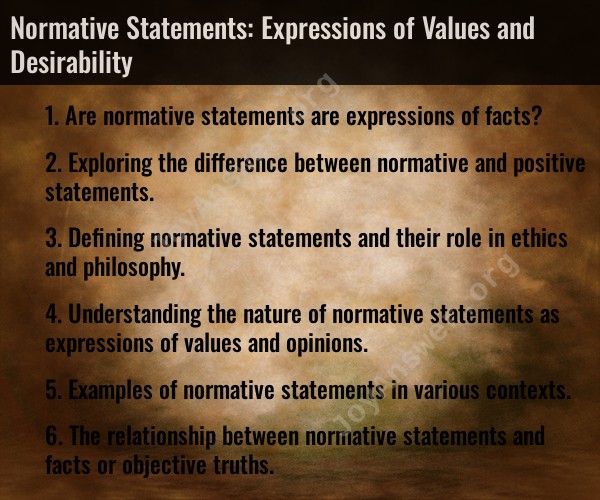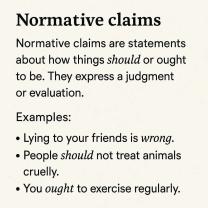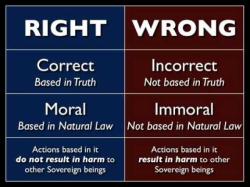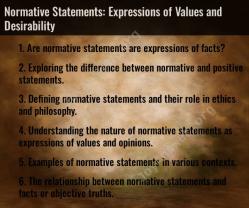Are normative statements are expressions of facts?
No, normative statements are not expressions of facts; they are expressions of values and desirability. Normative statements are subjective statements that convey opinions, beliefs, or judgments about what should be or what is considered morally right or wrong. They express a norm or a standard of behavior or a particular viewpoint on a given issue, often involving matters of ethics, morality, or personal preference.
In contrast, factual statements, also known as positive statements, are objective and can be empirically tested and verified. They describe what is, based on observable data and evidence. Factual statements are not influenced by opinions or subjective values.
Here's a simple way to distinguish between normative and factual statements:
Normative Statement: This type of statement expresses a value judgment, opinion, or belief about what should or should not be the case. It often contains words like "should," "ought," "good," "bad," or "right." For example, "Smoking is bad for your health," is a normative statement because it conveys a value judgment about smoking.
Factual Statement: Factual statements are objective and describe the world as it is, without expressing opinions or values. They can be tested and verified through observation and evidence. For example, "Smoking increases the risk of lung cancer," is a factual statement because it is based on empirical data and can be objectively assessed.
Understanding the distinction between normative and factual statements is crucial in fields such as philosophy, ethics, and social sciences, as it helps in recognizing the difference between statements of opinion and statements of fact.
Exploring the difference between normative and positive statements
Normative statements are statements that express an opinion or judgment about what ought to be. They are based on values and beliefs, and they cannot be proven or disproven.
Positive statements, on the other hand, are statements that describe the world as it is. They are based on facts and evidence, and they can be proven or disproven.
Defining normative statements and their role in ethics and philosophy
Normative statements play an important role in ethics and philosophy. They are used to make moral judgments, to develop ethical theories, and to guide human behavior.
For example, the normative statement "Stealing is wrong" expresses a moral judgment about the act of stealing. It is based on the value of honesty, and it cannot be proven or disproven.
Another example of a normative statement is the philosophical statement "The best way to live is to live in accordance with reason." This statement expresses a judgment about the best way to live, and it is based on the value of reason.
Understanding the nature of normative statements as expressions of values and opinions
Normative statements are expressions of values and opinions. They reflect the speaker's beliefs about what is right and wrong, good and bad, desirable and undesirable.
For example, the normative statement "It is wrong to harm others" expresses the speaker's value of non-harm. The normative statement "Happiness is the most important thing in life" expresses the speaker's value of happiness.
Examples of normative statements in various contexts
Normative statements can be found in a variety of contexts, including:
- Ethics: "It is wrong to lie." "We should help those in need."
- Politics: "The government should provide healthcare for all citizens." "The death penalty is wrong."
- Religion: "We should love our enemies." "We should obey the laws of God."
- Personal life: "I should eat healthy foods." "I should spend more time with my family."
The relationship between normative statements and facts or objective truths
Normative statements are not facts or objective truths. They are expressions of values and opinions.
For example, the normative statement "Stealing is wrong" is not a fact or an objective truth. It is an expression of the speaker's value of honesty.
Another example is the normative statement "The best way to live is to live in accordance with reason." This statement is not a fact or an objective truth. It is an expression of the speaker's value of reason.
Normative statements can be based on facts, but they are not themselves facts. For example, the normative statement "We should help those in need" may be based on the fact that there are many people in the world who are suffering. However, the statement itself is not a fact. It is an expression of the speaker's value of compassion.
Conclusion
Normative statements are an important part of human language. They allow us to express our values and opinions, to make moral judgments, and to guide our behavior. It is important to understand the difference between normative statements and positive statements, and to be aware of the role that normative statements play in our lives.












